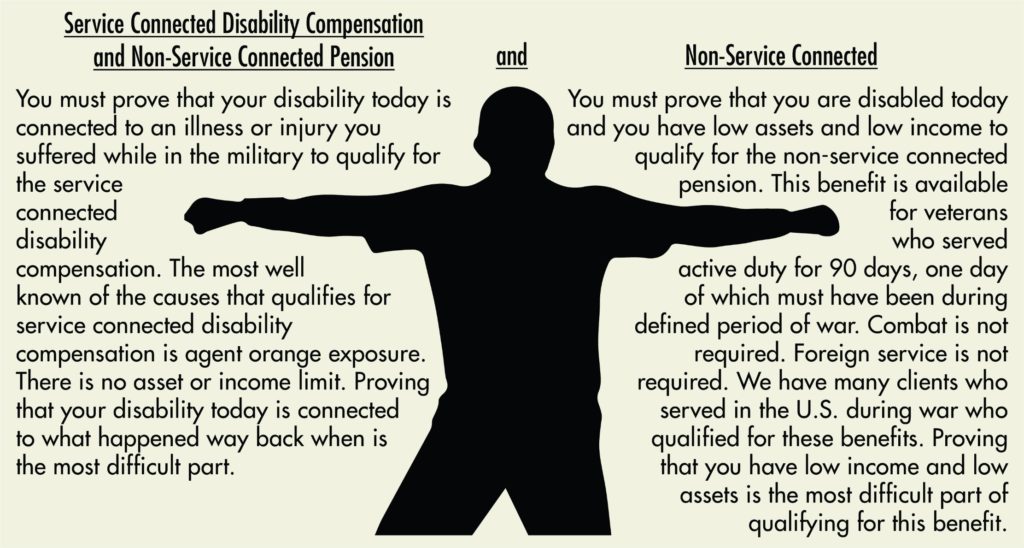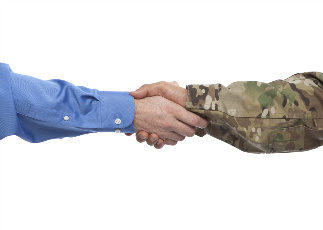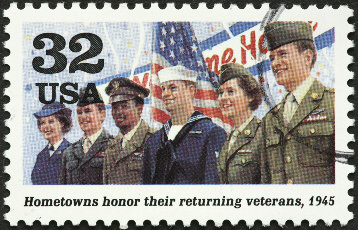Our attorneys are accredited to practice law in front of the United States Department of Veterans Affairs. Only accredited attorneys, claims agents, or veterans service organizations representatives may file applications and appeals. There are two arms of the VA that pay veterans and their dependents compensation pension. The VA pays a non-service connected pension (aid and attendance) if the veteran otherwise qualifies and has low assets, low income and high unreimbursed medical expenses. The VA pays disability compensation if the veteran otherwise qualifies and can show that the veteran’s disability today is connected to an injury or illness that occurred during active duty.
There are two arms of Veterans Administration that pay Veterans and their dependents monthly income:

Veterans who have served during a period of war, who were honorably discharged, and are over the age of 65 or are disabled are entitled to a pension if they have low income and assets. Surviving spouses are also entitled to the benefit based on their spouse’s service.
The VA will help a veteran fill out the application, but won’t advise the veteran on how to qualify. At Marquardt Law Firm, we advise veterans how to maximize the public benefits to which they are entitled and help you with the submission process.
Request to Stop VA after Medicaid has Started
We must notify the VA when a claimant moves into a nursing home and begins Medicaid benefits.
Statement Related to Nursing Home Verification to Medicaid
We ask the VA for a breakdown in pension to base and Aid and Attendance to convince Medicaid that the entire NSC pension plus Aid and Attendance is not countable income for Medicaid purposes. We ask the VA to send the appropriate information to the state’s Medicaid office.
In order for the Medicaid recipient to be allowed to receive cash from Aid and Attendance, the Medicaid recipient must have unreimbursed medical expenses that offset income. If Medicaid is paying the entire cost of care, there are no unreimbursed expenses, and aid and attendance is not allowed.
A married veteran or a veteran with eligible dependents who is in the nursing home might be receiving Aid and Attendance because of high unreimbursed medical expenses for the spouse at home or dependents at home. If the married veteran pays for the care of someone at home, and that care is not being reimbursed, it might be the basis for receiving aid and attendance.
$90.00 Personal Allowance Request
If the Medicaid recipient is single without dependents, and Medicaid is paying the full cost of care, the VA benefit must be reduced to the allowable $90 personal allowance.
If the Medicaid recipient is a married veteran or has an eligible dependent, there is no automatic personal allowance reduction.
Frequently Seen Applicants
- Veteran and spouse living at home. One spouse is in need of personal care services.
- Veteran and spouse living at home. Both spouses are in need of personal care services.
- Veteran living at home is in need of personal care services.
- The surviving spouse of a deceased Veteran living at home is in need of personal care services.
Tips for Care Providers
- The VA will pay the maximum amount of aid and attendance pension only if unreimbursed medical expenses (the cost of personal care services) exceed household gross income.
- Personal care services will be considered an unreimbursed medical expense by the VA if a doctor signs a certificating form that proves your patient needs in-home care.
- Ask us for a doctor’s certification form if you are going to help your patient:
- Dress or undress
- Keep ordinarily clean and presentable (showering)
- Toileting because of incontinence
- Manage medication because of memory problems, or
- Transfer from a bed or chair and take fifteen steps, or
- By protecting him or her from hazards and dangers incident to daily environment (it would be dangerous to leave your patient alone because he or she would start a fire or walk out the front door and get lost)
- If all of the household gross income is spent on unreimbursed medical expenses, how will your patient pay for the home mortgage, property taxes, homeowners insurance, utility bills, and food?
- The patient must have some savings or help from an adult child to pay for everything other than unreimbursed medical expenses during the pendency of the VA application.
- Hiring a personal care service company sooner rather than later is beneficial because your patient will have more savings and your patient will maintain better health and vitality for a longer period of time.
- Don’t wait until the patient is already “broke” or already severely incapacitated or disabled before applying for VA benefits.
- Marquardt Law Firm, P.C. can help your patient with estate planning (wills, durable power of attorney, medical power of attorney, HIPAA Release, DNR, Living Will, or an Asset Protection Trust) to tax-efficiently protect and preserve assets, reduce family conflict, and maximize government benefits.TM
- Once the VA aid and attendance pension starts to pay, your patient will have additional income to pay for the home mortgage, property taxes, homeowners insurance, utility bills, and food.



